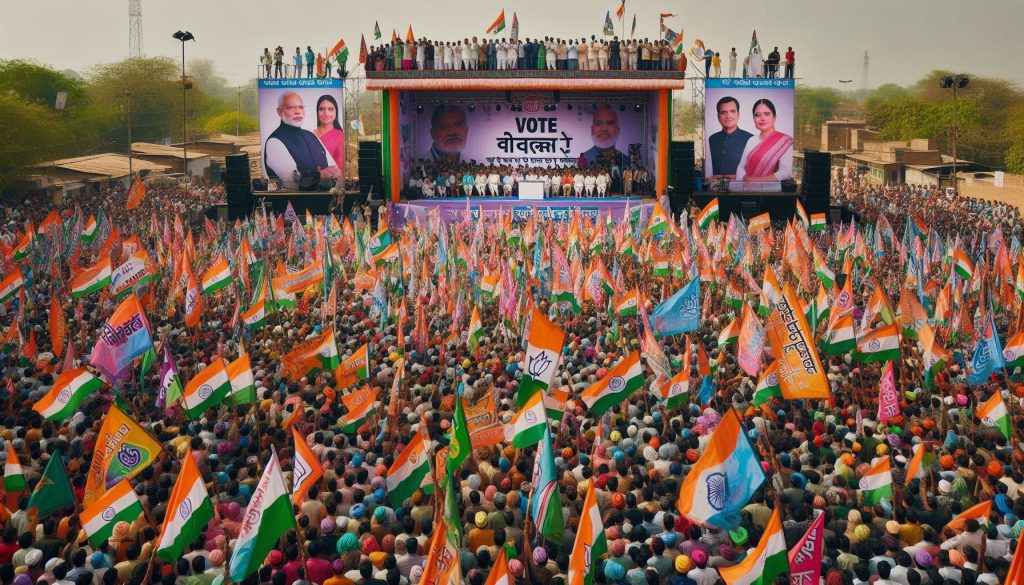Electoral Politics – Complete Guide For Class 9 Political Science Chapter 3

Welcome to iPrep, your Learning Super App. Our learning resources for the chapter, “Electoral Politics” in Political Science for Class 9th are designed to ensure that you grasp this concept with clarity and perfection. Whether you’re studying for an upcoming exam or strengthening your concepts, our engaging animated videos, practice questions and notes offer you the best of integrated learning with interesting explanations and examples.
This chapter titled “Electoral Politics” delves into the intricacies of electoral politics, exploring the significance of elections in a democracy, the mechanics of the electoral process, and the factors that contribute to free and fair elections. By examining the Indian electoral system within the framework of “Electoral Politics,” we will gain insights into how elections shape the political landscape and reflect the will of the people.
Elections are the cornerstone of democratic governance, and the chapter “Electoral Politics” provides an in-depth exploration of how they function. This chapter titled “Electoral Politics” examines why elections are essential, how they are conducted, and the factors that contribute to their democratic nature. Through an analysis of the Indian electoral system within the context of “Electoral Politics,” we will gain a deeper understanding of the challenges and complexities involved in managing elections in a large and diverse country.
Objectives Of Learning The Chapter Electoral Politics
The objectives of the chapter “Electoral Politics” are as follows:
- To understand the importance of elections in a democratic system
- To learn about the different components of the electoral process
- To analyze the factors that contribute to free and fair elections
- To evaluate the strengths and weaknesses of the Indian electoral system
- To develop a critical perspective on the role of elections in shaping political outcomes
Now let us examine the various sections of the chapter in detail.
First of all, to understand the fundamental role of elections in a democratic setup, let’s delve into the section “Why Elections?” of the chapter “Electoral Politics.”
Why Elections?
Elections are the mechanism through which people choose their representatives to govern them. They provide a platform for political competition, allowing citizens to express their preferences and hold elected officials accountable.
- Assembly elections in Haryana:
A recent example of elections in action, as discussed in the chapter “Electoral Politics,” is the assembly elections in Haryana. These elections demonstrated the electoral process and its impact on governance.
- Why do we need elections?
The chapter “Electoral Politics” explains that elections are essential for ensuring popular sovereignty, providing opportunities for political participation, and facilitating peaceful transitions of power.
- What makes an election democratic?
According to “Electoral Politics,” free and fair elections, universal adult suffrage, and regular intervals between elections are key characteristics of democratic elections.
- Is it good to have political competition?
“Electoral Politics” discusses how political competition can lead to better governance by forcing parties to offer alternative policies and programs.
Building upon our understanding of the significance of elections, let’s explore the mechanics of the electoral process in India, as outlined in the chapter “Electoral Politics.”
What Is Our System of Elections?
The Indian electoral system, as described in “Electoral Politics,” is a complex machinery involving various stages and actors.
- Electoral constituencies:
The chapter “Electoral Politics” details how the country is divided into constituencies for elections, ensuring representation of different regions and populations.

- Reserved constituencies:
“Electoral Politics” highlights how certain constituencies are reserved for Scheduled Castes and Scheduled Tribes to enhance their political representation.

- Voter’s list:
The electoral roll, as explained in “Electoral Politics,” is a comprehensive list of eligible voters, forming the foundation of the electoral process.
- Nomination of candidates:
“Electoral Politics” describes how political parties and independent candidates can nominate themselves to contest elections.

- Election campaign:
The chapter “Electoral Politics” explores how candidates and parties engage in campaigns to garner public support and articulate their vision.
- Polling and counting of votes:
According to “Electoral Politics,” the actual voting process and the subsequent counting of votes determine the election outcome.
Now, to assess the democratic credentials of the Indian electoral system, let’s examine the factors that contribute to its fairness and credibility, as discussed in the chapter “Electoral Politics.”
What Makes Elections in India Democratic?
India has made significant strides in conducting free and fair elections, but challenges persist, as outlined in “Electoral Politics.”
- Independent Election Commission:
The chapter “Electoral Politics” emphasizes the crucial role of the Election Commission of India in ensuring the impartiality and integrity of the electoral process.
- Popular participation:
“Electoral Politics” underscores how high voter turnout is a testament to the people’s faith in the electoral system.


- Acceptance of election outcome:
The peaceful acceptance of election results, as highlighted in “Electoral Politics,” is a hallmark of a mature democracy.
- Challenges to free and fair elections:
“Electoral Politics” discusses issues such as money power, criminalization of politics, and electoral malpractices that pose threats to the fairness of elections.

Finally, as we have gained complete knowledge about the chapter “Electoral Politics” let us know the overall learning value of the lesson.
Overall Learning Value of the Chapter
The chapter “Electoral Politics” concludes that electoral politics is the lifeblood of a democracy, providing citizens with a voice in governance. The Indian electoral system, while facing challenges as noted in “Electoral Politics,” has largely delivered free and fair elections, strengthening the country’s democratic fabric. By understanding the electoral process and its significance through the lens of “Electoral Politics,” citizens can become more engaged and informed participants in the democratic enterprise.
Let’s Conclude
In conclusion, the chapter Electoral Politics in CBSE Class 9th Political Science offers a comprehensive exploration of the democratic process and its importance in India. Through Electoral Politics, students gain insight into the mechanics of elections, the principles of a democratic electoral system, and the vital role elections play in reflecting the will of the people. This chapter demonstrates how Electoral Politics ensures fair representation, empowers citizens, and upholds the core values of democracy. With an understanding of Electoral Politics, students are encouraged to actively engage in the democratic process, recognizing its impact on governance and societal progress.
Practice questions on Chapter 3 - Electoral Politics
Get your free Chapter 3 - Electoral Politics practice quiz of 20+ questions & detailed solutions
Practice Now








